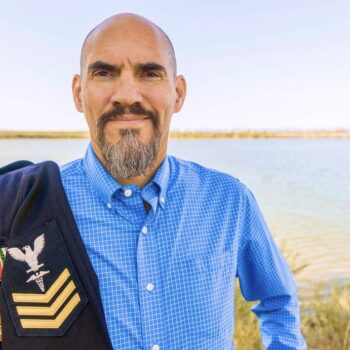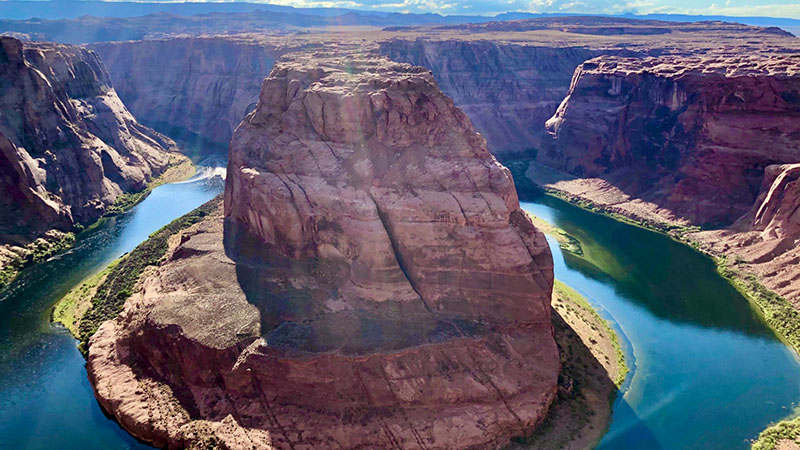October 11, 2022
My family history is steeped in water. My father was a water master for the Elephant Butte Irrigation District in the Las Cruces area, and my sister is currently a pecan farmer. Growing up in southern New Mexico, some of my fondest memories include floating the Rio Grande from the Caballo Dam Lake area down to the small town of Hatch. I spent years in the U.S. Navy, kayaked world-class rapids down the Rio Grande Gorge, and have a love for river rafting, paddle boarding, and fly fishing, which I now get to share with my two daughters.
As we mark Hispanic Heritage Month and celebrate all the ways in which Latinos and Latinas contribute to our communities, I want to recognize that it is inherent in our culture to be a conservationist. While we might not always think of ourselves that way, there has been increasing awareness and recognition over the last few years that our values — from frugality to living the recycle-reduce-reuse mantra — enable the Latino community to embody the values that protect our environment.
I see this growing awareness happening as Latinos and Latinas — both young and old — are coming together to share stories and collectively call for clean water, cleaner and more efficient energy, and stewardship of the land.
Our elders are passing down knowledge about leaders such as Cesar Chavez and Dolores Huerta. Younger generations are finding newer inspiration today through artists such as Maná, which has songs about clean air and injustices faced by environmental advocates in Mexico, and even Bad Bunny, a Puerto Rican singer whose music encourages raising your voice.
Alongside this movement in our families and communities are groups that are leading the way on policy. There’s Mi Familia Vota, which works nationally and in states to unite Latino, immigrant, and allied communities to promote social and economic justice through citizenship workshops and voter participation. CLLARO, a Colorado-based group, empowers Latinos through leadership development, advocacy, and policy research to strengthen the state. And GreenLatinos, where I work as the Colorado Clean Transportation and Energy Policy advocate, is an active community of Latino, Latina, and Latinx leaders fighting for political, economic, cultural, and environmental liberation.
These groups, and so many others, are doing important policy and advocacy work that is giving people a voice, which is sorely needed in a community that is used to being marginalized. For example, the Latino community is among the first to be impacted by the effects of climate change, such as extreme heat, due in part to our work in the agricultural and construction industries. We are also more likely to live near travel corridors and polluting industries due to long-standing racist policies, which contributes to higher rates of dangerous health problems among the Latino community like respiratory and cardiac issues.
These inequities, as well as my passion for water quality issues and my multi-decade career in the healthcare space, inspire me to give back to my community in a multitude of ways. From my work at GreenLatinos that addresses environmental problems through a public health lens to operating a small business that provides free health education courses to monolingual Spanish speakers, I’m driven by a desire to help and give others knowledge so they can improve their lives.
I’m particularly excited to have recently been elected as the first Latino president of the Colorado Public Health Association (CPHA), the oldest and largest public health organization in the state. At the recent Public Health in the Rockies Conference presented by the CPHA, I got to see first-hand powerful and important work presented by Latino and Latina researchers. It reminded me that while Latinos have a culture and history that is rich in areas such as performing arts and culinary, we – particularly our young people and mid-career professionals — are also contributing to our communities in countless other ways, from health and legal professions to community empowerment and serving at some of the highest levels of our city, state, and federal governments. Hispanic Heritage Month covers all of our roots and encourages us to lift up these stories of impact in every community, even in the Latino community.
It also serves as a reminder to have hope. I stay motivated by the small wins we are achieving for the Latino community and knowing that what I’m doing today, including my support for WRA as a donor, is making a difference for my daughters’ generation and for their children.
As I reflect back on a rafting trip I took with my daughters to James M. Robb Colorado River State Park near Grand Junction, I think about our shared connection with water. While floating down the river, we talked about how it provides so much life to everything that it touches, and I was reminded of the times I floated the Rio Grande River with my father and brothers. I feel fortunate to be able to share these memories with my daughters while creating new ones, especially as Western rivers face the impacts of climate change, and I’m driven to build a better future for them. I see that as part of my role, and it’s part of all of our roles, to advocate for our community and have an impact where we can.



